Mighty Joe Young Blu-ray Movie
HomeMighty Joe Young Blu-ray Movie 
Warner Bros. | 1949 | 94 min | Not rated | Oct 27, 2015
Movie rating
7.3 | / 10 |
Blu-ray rating
| Users | 0.0 | |
| Reviewer | 4.0 | |
| Overall | 4.0 |
Overview
Mighty Joe Young (1949)
A slick nightclub owner discovers an adult gorilla living happily in Africa as the beloved pet of a young woman. He brings both to Hollywood as a floor-show sensation, until some no-goods ply Joe with booze and the blitzed behemoth goes bonkers.
Starring: Terry Moore (I), Ben Johnson, Robert Armstrong (I), Mr. Joseph Young, Frank McHughDirector: Ernest B. Schoedsack
| Sci-Fi | Uncertain |
| Drama | Uncertain |
| Adventure | Uncertain |
| Fantasy | Uncertain |
Specifications
Video
Video codec: MPEG-4 AVC
Video resolution: 1080p
Aspect ratio: 1.37:1
Original aspect ratio: 1.37:1
Audio
English: DTS-HD Master Audio Mono (48kHz, 24-bit)
Spanish: Dolby Digital Mono
Subtitles
English SDH, French, Spanish
Discs
50GB Blu-ray Disc
Single disc (1 BD)
Playback
Region free
Review
Rating summary
| Movie | 4.0 | |
| Video | 4.5 | |
| Audio | 3.5 | |
| Extras | 3.5 | |
| Overall | 4.0 |
Mighty Joe Young Blu-ray Movie Review
You Can Take the Gorilla Out of the Jungle . . .
Reviewed by Michael Reuben October 30, 2015Sixteen years after the rushed sequel to King Kong disappointed at the box office, its core creative team reunited for Mighty Joe Young (or "MJY"). In spirit, if not literally, MJY is the true sequel to Kong, because, unlike The Son of Kong, MJY offers the kind of grand spectacle and memorable scenes that inspire fans to revisit the film again and again. Willis O'Brien, a veteran of Kong, designed the elaborate visual effects, but their realization was largely the work of his assistant, a relative newcomer named Ray Harryhausen. The script by Kong co-writer Ruth Rose, from a story by Kong producer Merian C. Cooper, reshuffled the basic elements of a wild ape who becomes devoted to a pretty human female and is exploited by an avaricious showman. But this time the ape was normal-sized, and his devotion to the girl was mutual. Also, the story had a happy ending—but only after Kong director Ernest B. Schoedsack staged enough chaos and destruction to ensure a jolly time at the movies. Despite favorable reviews and an Oscar in the relatively new category of Visual Effects, MJY was a box office failure. Audiences of the Cold War era could no longer enjoy the cinematic "imagination of disaster" the way they did in the Thirties. Over the next few years, episodes of mass destruction onscreen would become the province of science fiction, where catastrophe typically resulted from the quest for knowledge, usually in the nuclear field, or from an alien invasion, which served as a thinly disguised metaphor for America's new enemies abroad. But MJY has endured, because it's a superbly crafted entertainment and one of the finest achievements in stop-motion animation ever created. The film's elaborate sequences have inspired many later effects wizards, a lineage that is evident in the commentary recorded for the 2005 DVD featuring five-time Oscar winner Ken Ralston (formerly at Industrial Light & Magic and now head of Sony Pictures Imageworks), as well as in the included interviews of Ray Harryhausen by The Chiodo Brothers, who are among his direct descendants in the art of puppet effects. By a stroke of good fortune, MJY also happens to be the film best represented on Blu-ray in Warner's new Special Effects Collection. (It is also available singly.) The reasons are discussed in the "Video" section below.
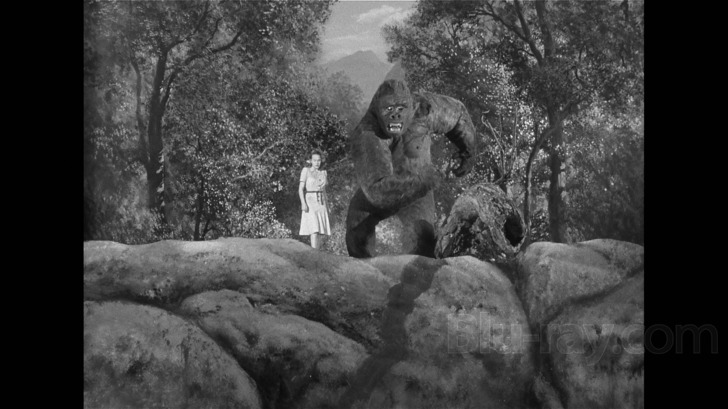
"Mr. Joseph Young", as he is called in the film's tongue-in-cheek credits, is an African gorilla who is raised from infancy as a friend and companion by Jill Young, the daughter of a farmer named John (Regis Toomey) who owns a large plantation in the African Great Lakes region. Jill is played as a precocious child by Lora Lee Michel and as an adult by Terry Moore. Some twelve years after Jill has "adopted" Joe, their peaceful isolation is interrupted by an expedition led by an ambitious producer, Max O'Hara (Robert Armstrong, who previously played the producer Carl Denham in the Kong films). Max's latest scheme is a grand Hollywood nightclub, the Golden Safari, that will out-glitter even the movies themselves. It's as if Max has foreseen the future of Las Vegas. To outfit the club, Max is capturing African lions, and to create PR buzz, he has surrounded himself with authentic cowboys, including an Oklahoma native named Gregg, who is played by future Oscar winner Ben Johnson (The Last Picture Show, The Wild Bunch) in his first major role. (Johnson was recommended for the part by director John Ford, a co-producer of MJY.) As soon as Max realizes that Joe is a pet gorilla who responds to Jill's commands, dollar signs flash before his eyes. Before she knows what hit her, Jill has signed a contract for Joe to headline Max's new club, under Jill's direction. The initial flush of excitement quickly fades for the country girl, as one sellout week follows another and homesickness for the open fields takes its toll on the show's massive star, who must spend his off-hours in a cage. Gregg, who shares Jill's empathy with animals and is falling in love with her as well, tries to persuade Max to let her take Joe back to Africa, but Club Safari is making too much money for Max to part with his star attraction. The issue is forced when some rowdy patrons provoke Joe into a destructive rampage that prompts the local authorities to order his destruction. Now even Max O'Hara comes around to the notion that Mighty Joe Young needs to go home. MJY features extended effects sequences of enormous complexity, especially when one considers the painstaking processes by which they were accomplished. O'Brien and Harryhousen utilized matte paintings, rear projection, front projection, miniatures and stop motion animation. They would shoot multiple "passes" on the same magazine of film in order to expose specific areas of the frame on each pass; Harryhausen used a stopwatch to synchronize movement frame by frame. The results can clearly be identified as effects shots, but they have a weight and solidity that no other style of effect has ever quite matched. What's perhaps most astonishing about these sequences from a 1949 film is how successfully they integrate the live-action performances with entirely animated elements. The first such sequence occurs when Joe attacks Max O'Hara's expedition, because they have unwittingly trespassed on Jill's farm. Though Joe is never more than a miniature puppet, he appears to knock over full-sized wagons and cages, fighting off lions and battling with multiple cowboys on horseback trying to lasso him. He swings Max off his horse and is on the verge of tearing him apart, when Jill runs up and intervenes. A second group of sequences involves the Club Safari, which is itself an effects creation, partly built on a soundstage and partly enhanced with projections of lions in cages (they are supposedly behind thick glass in an exhibit that surrounds the club). On a huge stage, with a band playing above him, Joe lifts Jill above his head on a platform where she's playing "Beautiful Dreamer" (his favorite song) on the piano. Then he wins a tug-of-war against ten world champions, catches huge coins tossed from the audience and performs other tricks. Even more complex is the sequence in which Joe wrecks the place, as patrons run screaming or fall on the floor, while the vaulted thatched roof collapses above them. A third group of effects scenes results from the efforts by Jill, Gregg and Max to rescue Joe from the death sentence pronounced upon him by the L.A. authorities. The standout sequence involves a blazing orphanage from which Jill, Gregg and Joe rescue children trapped on upper floors. The combination of human actors, pyrotechnics, collapsing models, miniature trees bursting into flame and a stop-motion gorilla with authentic fear on his face is unlike anything else. (Note that this climactic sequence was originally filmed in the same black-and-white as the rest of MJY. At a later point, however, the sequence was tinted reddish orange, and this is how it appears on Warner's Blu-ray.)
Mighty Joe Young Blu-ray Movie, Video Quality 
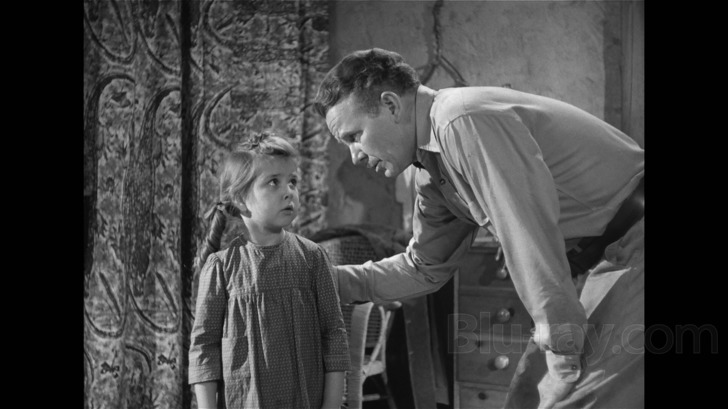
The credited cinematographer on Mighty Joy Young is J. Roy Hunt (I Walked with a Zombie), although many of the scenes were actually photographed by Ray Harryhausen, who operated the camera, one frame at a time, for the many scenes containing stop-motion animation. As with the other titles contained in Warner's Special Effects Collection, MJY has been newly scanned at 2k from a fine-grain positive for this 1080p, AVC-encoded Blu-ray, but anyone who views all four discs will immediately notice that MJY has the best image of the bunch. This remains obvious even after making due allowance for the inevitable softness and loss of detail that occurs in various effect shots containing multiple layers of opticals, rear projection and multiple "passes" of the same negative to combine various elements. (Harryhausen describes the process in the interviews contained in the extras.) In MJY's non-effects shots, and even in effects shots, if one concentrates on the last element added, which is usually Joe Young himself, the Blu-ray image reveals a level of clarity, a degree of detail and a sense of depth that even the films made later (i.e., Them! and The Beast from 20,000 Phantoms) cannot match. The difference is attributable to the source material. As some readers will know, the silver nitrate film stocks commonly used before 1951 were subject to many risks. They could decompose or deteriorate, and they were also highly flammable. Many original camera negatives (OCNs), and more than a few lives, were lost as a result of vault fires caused by nitrate stocks, which is why nitrate was phased out and replaced by so-called "safety stock". On the plus side, however, nitrate, in the rare instance where it has survived, produces a noticeably superior image when scanned for video. Some people call it the nitrate "sparkle". The OCN for MJY no longer exists, but it just so happens that the surviving fine-grain master used for this new scan is nitrate-based. That is what accounts for the additional luster, detail and depth in the Blu-ray image, as well as the solidity of the blacks and the overall clarity, even when the image softens due to the effects processing. In its best moments, MJY is a reminder of just how superbly Blu-ray can reproduce the experience of black-and-white motion picture photography. To ensure that the full benefit of MPI's scan and restoration work appears on Blu-ray as intended, Warner has encoded MJY with an average bitrate of 34.85 Mbps, which is a figure more commonly seen from the Warner Archive Collection.
Mighty Joe Young Blu-ray Movie, Audio Quality 
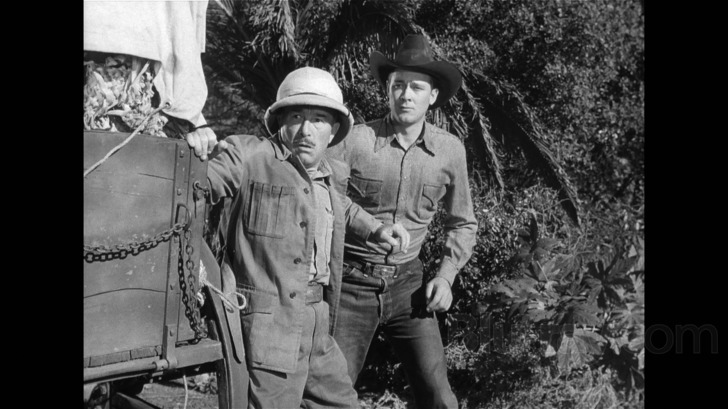
MJY's original mono soundtrack is presented in lossless DTS-HD MA mono, and it sounds very good for its era. There is no distortion or other interference. The dialogue and effects are clear, and Joe's roar has sufficient dynamic range to make the requisite impact. The musical score by Roy Webb (Out of the Past) navigates the film's tricky emotional turns effectively.
Mighty Joe Young Blu-ray Movie, Special Features and Extras 
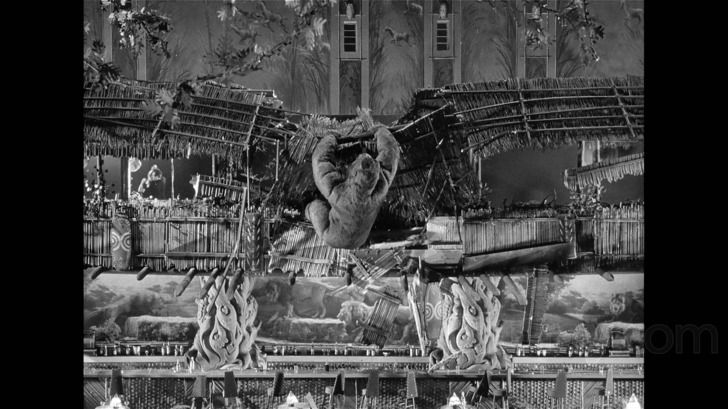
The extras have been ported over from Warner's 2005 DVD of Mighty Joe Young.
- Commentary with Effects Technician Ray Harryhausen, Actress Terry Moore and Ken Ralston: Moore tells great stories about working with director Schoedsack and producer Cooper (who was the model for Max O'Hara), while Harryhausen describes how he came to work on the project and the mechanics of operating the various puppets of Joe, his favorite of which was nicknamed "Jennifer". Ralston, who is an unabashed fan, keeps the discussion going by asking questions and pointing out noteworthy elements in specific scenes.
- A Conversation with Ray Harryhausen and The Chiodo Brothers (480i; 1.33:1; 22:52): Stephen, Charles and Edward Chiodo are an effects team responsible for, among other things, the marionettes in Team America: World Police. Harryhausen is one of their inspirations. In this wide-ranging interview, Harryhausen discusses his background, his work with Willis O'Brien and various effects in MJY.
- Ray Harryhausen and Mighty Joe Young (480i; 1.33:1; 11:57): Stephen and Charles Chiodo interview Harryhausen specifically about MJY, with one of the original models for Joe used to illustrate how the film's title character was brought to life.
- Theatrical Trailer (480i; 1.37:1; 1:41): "The Most Astounding Movie Since Movies Began—You Won't Believe Your Eyes!"
Mighty Joe Young Blu-ray Movie, Overall Score and Recommendation 
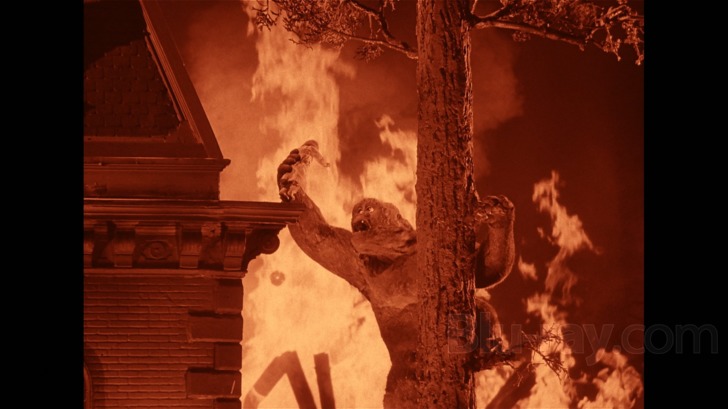
As Ray Harryhausen says several times in his interviews and commentary, he worked in an era when the audience didn't scrutinize visual effects as they do now, looking for mistakes and fakery, trying to puncture the illusion. He had the advantage of doing magic tricks for viewers who wanted to believe in the reality of what they were seeing and were willing to play along with the filmmakers. He didn't worry about whether one part of the frame was more or less detailed; instead, he cared about whether the creature he was animating had personality, expressed emotion and gave a good performance. The best effects people always make these elements their top priority, no matter what technology they are using. It's why their work endures, even after the technology dates. MJY is a prime example. Highly recommended.
Similar titles
Similar titles you might also like

Son of Kong
The Son of Kong
1933

The Beast from 20,000 Fathoms
1953

At the Earth's Core
1976

King Kong
Warner Archive Collection
1933

Island of Lost Souls
Uncut Theatrical Version
1932

Konga
1961

King Kong 4K
Limited Edition
1976

The Land Unknown
1957

The People That Time Forgot
1977

Mysterious Island
Limited Edition to 3000 - SOLD OUT
1961

Them!
1954

Ape 3D
A*P*E / The New King Kong
1976

The Valley of Gwangi
Warner Archive Collection
1969

Creature from the Black Lagoon 4K + 3D
1954

The Giant Claw
1957

Hammerhead
Sharkman
2005

The Twilight People
Island of the Twilight People
1972

The Mole People
1956

Mimic
The Director's Cut
1997

Wildling
2018